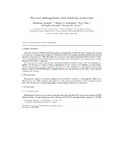Two new anthraquinones from Gladiolus psittascinus

Date
2007Author
Ngamba, D.
Awouafack, M.
Tane, P.
Bezabih, M.
Abegaz, B.
Publisher
Elsevier Ltd. www.elsevier.com/locate/biochemsysecoType
ArticleMetadata
Show full item recordAbstract
Gladiolus psittascinus HOOK, an herbaceous plant, is propagated by its bulb. This onion-looking plant occurs in
rocky places in western province of Cameroon. The bulbs are used to treat asthma, gonorrhoea, diabetes and intestinal
parasites (Adjanohoun et al., 1990). The bulbs of G. psittascinus were collected in Dschang (West Province of Cameroon)
in July 2005 and identified by Mr Francois Nana, a botanist at the National Herbarium, Yaounde where a voucher
specimen (55925 HCN) is deposited.
We report here the isolation and structural elucidation from the chloroform extract of two new anthraquinones
namely: 1,6,7-trihydroxy-3-methoxy-8-methyl-anthraquinone (1) and 1-hydroxy-3,6,7-trimethoxy-8-methyl-anthraquinone
(2) along with four known compounds. The structures of the compounds were elucidated by spectroscopic
analysis, mainly, 1D and 2D NMR and by comparing their physical (mp) and spectroscopic (Table 1) data with those
reported in the literature.
